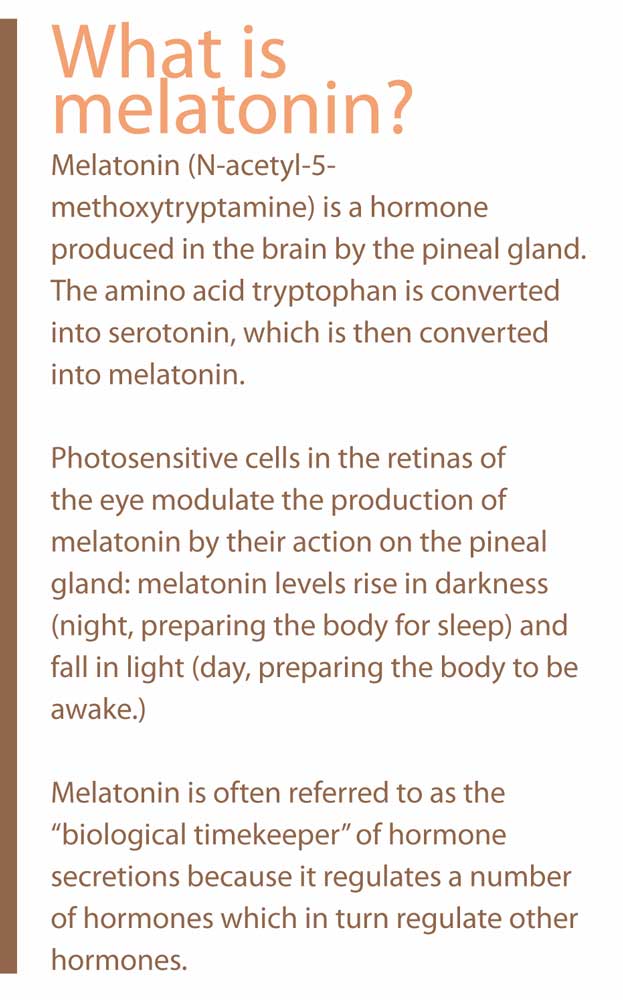Along with promoting sleep, melatonin may also help with Cushing’s disease, separation anxiety and other dog and cat health problems.
Melatonin as a nutritional supplement is often used by humans for sleep problems, but it also has several health applications for dogs and cats. Melatonin possesses a number of reported actions:
- Regulates the immune system — lymphocyte white blood cells synthesize and release large amounts of melatonin
- Induces restful sleep
- Acts as an antioxidant – it’s a potent free radical scavenger
- Reduces skin damage caused by UV radiation, when applied topically
- Opposes degenerative side effects caused by elevated levels of corticosteroids
- Is being used as part of the therapy for hormone-induced cancers
- Reduces (at high doses) side effects and enhances cancer-killing abilities of chemotherapy and radiation therapy, by promoting cancer cell death and the release of immune-modulating chemicals called cytokines
In people, it is also used for insomnia arising from many causes (lack of sleep, ADHD, beta blocker blood pressure medication, etc.); sleep problems in autistic individuals; dementia and Alzheimer’s disease; depression; chronic fatigue syndrome; epilepsy; numerous cancers; as an anti-aging supplement; and for weight loss. As more research continues, it is likely additional uses of melatonin will be found.
How is it used in animals?
In dogs and cats, melatonin has been prescribed for several conditions.
1. Sleep problems: Melatonin can induce restful sleep. This may be helpful for older animals that have trouble with normal sleep-wake cycles, typically seen in those with cognitive disorder (i.e. dog or cat “Alzheimer’s”).
2. Cushing’s disease: This condition involves an overproduction of hormones, most commonly cortisol, in the dog’s adrenal glands. It’s usually due to a benign tumor of the pituitary gland in the brain (some cases are caused by malignant tumors of the adrenal glands).
Melatonin is currently used as part of the natural therapy regimen for some dogs with the pituitary form of Cushing’s disease, although its exact mechanism of action is unknown and its effectiveness varies among patients. Suggested actions of melatonin include the inhibition of certain enzymes needed for the conversion of one hormone to another; for example, the inhibition of aromatase enzymes, which decreases androstenedione and testosterone conversion into estradiol and possibly the 21-hydroxylase enzyme (which would decrease cortisol levels.)
In addition to various herbal and homeopathic remedies to help patients with Cushing’s disease (as well as those with pre-Cushing’s elevations of ALP enzymes), melatonin may be added to the treatment plan along with flax seed. The lignans in the freshly-ground flax seeds may lower the estradiol levels that can increase in animals with adrenal disease.
3. Separation anxiety: Melatonin has been used in the treatment of separation anxiety in dogs, possibly due to its sedative effect. It may also be tried as a treatment for other stressful conditions, such as noise anxieties related to fireworks. However, any effect on behavioral problems is likely to be confined to animals with mild anxieties.
4. Type II diabetes mellitus: Animals may benefit from a treatment plan that incorporates melatonin.
5. Cancer: It is used in many human patients with various cancers, especially those related to hormones (breast, prostate, etc.). It may also be beneficial as a general supplement for dogs and cats with cancer.
6. Alopecia X: The first suggested use in dogs was for the treatment of the canine skin disease alopecia X, a condition of unknown cause resulting in hair loss, typically seen in Chows and Pomeranians. It may work by correcting a deficiency of the melatonin hormone or by directly promoting hair regrowth or a thicker coat.
Most people assume that melatonin is solely for sleep issues, but when used correctly, it has many additional potential health benefits for both humans as well as for our dogs and cats.
Side effects and contraindications
Melatonin is generally considered safe when used at the recommended dosage, although it should only be used under the supervision of your veterinarian. After all, it is a hormone and can interact with numerous processes in your dog or cat’s body, as well as with other medications. Because it regulates hormones, extended use may interfere with the actions of other hormones, so regular monitoring is advised if used for long periods of time.
- Excessive drowsiness can occur in patients treated with melatonin, particularly at higher dosages.
- It is not recommended during pregnancy or lactation, due to its effects on other hormones and its ability to cross the placenta.
- There have been rare reports of increased seizures in children suffering from neurological disorders after the administration melatonin. This has not been reported in animals.
- It may decrease fertility.
- In people, it should not be used during pregnancy or when nursing; depression; in patients with nocturnal asthma; in adolescents; in patients using corticosteroids for anti-inflammatory or immune-suppressive effects; or in patients with fibromyalgia or diabetes. Research suggests that melatonin may be harmful in patients with autoimmune diseases.
- Sedative medications/antidepressants interact with melatonin, which might increase sleepiness and drowsiness or increase the side effects of antidepressants.
- Anticoagulants interact with melatonin.
- In a small percentage of people taking melatonin at night to induce restful sleep, the opposite effect is seen and insomnia occurs. Using a lower dose or administering it in the morning may be helpful. This may also occur in animals. If used as a sleep aid, use the lowest effective dose possible.
- Administration of corticosteroids may suppress melatonin synthesis; administering melatonin may counter the side effects of corticosteroids, including alterations in sleep-wake cycles. Patients taking corticosteroids for immune-suppressive effects should be monitored closely for adverse reactions (decreased efficacy of corticosteroid therapy) when given melatonin.
- Caution or avoidance is indicated in patients taking anti-high blood pressure medications, since combining them may cause uncontrolled blood pressure.
Post Views: 137
Veterinarian Dr. Shawn Messonnier wrote The Natural Health Bible for Dogs and Cats, The Natural Vet’s Guide to Preventing and Treating Cancer in Dogs, and 8 Weeks to a Healthy Dog. He’s the pet care expert for Martha Stewart Living’s “Dr. Shawn – The Natural Vet” on Sirius Satellite Radio, and creator of Dr. Shawn’s Pet Organics. His practice, Paws & Claws Animal Hospital (petcarenaturally.com), is in Plano, Texas.


